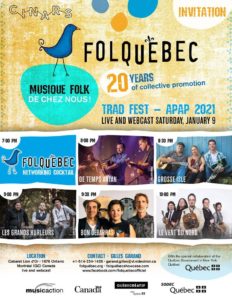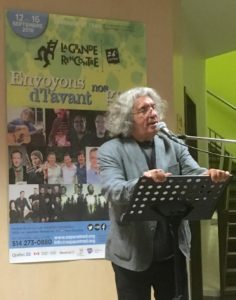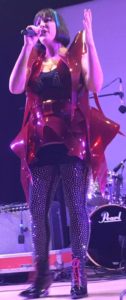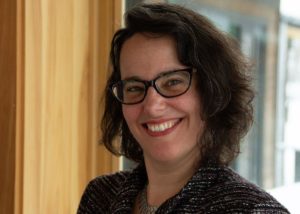As in years past, an evening of music from Quebec was a highlight of the annual conference of the Association of Performing Arts Professionals (APAP), Jan. 8-12, 2021. However, like the multi-day conference itself, the Folquebec TradFest did not take place in-person in New York City but, rather, was livestreamed due to the COVID-19 pandemic.
 Through its online showcases, Folquebec – an active participant at APAP conferences for the past nine years — aims to offer conference attendees an introduction to Quebec’s traditional, folk and world music scene, according to Gilles Garand, president and artistic director of the nonprofit organization that is now celebrating its 20th anniversary.
Through its online showcases, Folquebec – an active participant at APAP conferences for the past nine years — aims to offer conference attendees an introduction to Quebec’s traditional, folk and world music scene, according to Gilles Garand, president and artistic director of the nonprofit organization that is now celebrating its 20th anniversary.
Quebecois traditional music, built around dancing, represents a melding of musical influences. It’s inspired by traditions brought to Quebec by early French settlers and later, by Celtic traditions brought to Anglo-Canada by Irish and, particularly, Scottish settlers.
By the early 20th century, a distinctly Quebecois version of traditional music had developed. It drew from such diverse influences as Scottish step dancing, Irish instrumental tunes, European dance forms, old French songs and 78 rpm records from the U.S. and Canada. The fiddle became Quebec’s primary instrument at the time, closely followed by the accordion. Other instruments have since been added to the mix as some contemporary artists have sought to reinterpret and keep Trad music alive.
As emcee of the Folquebec TradFest, Garand introduced five of the Canadian province’s premier folk and roots groups – Bon DeBarras, De Temps Antan, Grosse Isle, Les Grands Hurleurs, and Le Vent du Nord. Each group showcased its talents live from Montreal’s Cabaret du Lion d’Or for 25 minutes.
Bon Débarras, which in English translates to good riddance, is a trio of multi-instrumentalists (Dominic Desrochers, Jean-Francois Dumas and Veronique Plasse) whose original roots repertoire is steeped in in poetry and rhythmic sounds, and blends traditional French-Canadian, Irish, Scottish and English musical influences with those of contemporary, multicultural Montreal. Besides accordion, banjo, guitars, harmonica and vocals, Bon DeBarras’ music features the infectious beat of podorhythmie (foot percussion) –- a staple of Quebecois traditional music.
De Temps Antan is a high-energy trio that is helping to bring Quebecois traditional folk music into the 21st century while adding original music stylings, a contemporary flair and joie de vivre. Since banding together nearly 17 years ago, Andre Brunet (a champion fiddler, who has also performed with Celtic Fiddle Festival), Eric Beaudry (rhythm guitar, mandolin, bouzouki and clogging) and Pierre Luc-DuPuis (accordion) have brought their rousing performances of songs jigs and reels to stages worldwide.
All three members previously were members of La Bottine Souriante, the band most closely associated with the 1970s folk revival in Quebec. With its instrumentation, a vast repertoire of call-and-response songs, and the French-Canadian seated clogging or step-dancing that often accompanies these proto-typical songs, La Bottine Souriante (The Smiling Boot) became a seminal Quebecois folk band that set the standard for De Temps Antan and others to follow.
Grosse Isle is a trio featuring Irish uileann piper Fiochra O’Regan, Quebec fiddler-pianist and singer Sophie Lavoie and noted guitarist Andre Marchand, who blend traditional Irish and Quebecois traditional music with Lavoie’s own compositions. The trio takes its name from an island in the St. Lawrence River where many Irish immigrants to Canada lived,
Les Grands Hurleurs is a trio fronted by Nicolas Pellerin. While rooted in Quebecois traditional music, the trio also fuses elements of classical, gypsy, folk music and electronica and adds its own arrangements to the mix. Currently working on another album for release this year, Les Grands Hurleurs have won three Felix Awards, Francophone Canada’s Juno equivalent.
Le Vent du Nord is a lively, soulful and prolific group of talented singers and multi-instrumentalists that has been expanding the bounds of Quebecois traditional music for nearly 20 years. The globetrotting ensemble has been the well-deserved recipient of multiple Junos, Felix and Canadian Folk Music Awards. Its repertoire includes both traditional folk and original tunes that are performed on button accordion, fiddle guitar and hurdy-gurdy.

Gilles Garand speaks during the 2018 Festival La Grande Rencontre in Montreal (iPhone Photo: Michael Kornfeld)
Noting that the formation of Folquebec stemmed from conversations at a Folk Alliance conference in 2000, Garand views conferences as “opportunities to share our knowledge and contribute to the concept of cultural reciprocity among artists.” Through its participation, Folquebec looks forward “to developing an ongoing partnership with leaders of North American cultural organizations to bring together our strengths, our resources, our complementarities in the advancement of the performing arts sector, and music in particular, of the broad cultural diversity of human expression through the arts,” he said.
“In this most unusual year of the COVID-19 pandemic, for music professionals, APAP was once again a inspiring meeting place and unique opportunity to meet people, to share and exchange together, discover new talent, new music and explore how to achieve in a virtual way our cultural objectives for the future.”
A Booking Agent and Traditional Music and Dance Aficionado Shares Her Thoughts
In addition to the Folquebec TradFest, two Quebec-based musical acts –- MAZ and Melisande (electrotrad] – were represented during the virtual conference in a pre-recorded showcase presented by the booking agency Canis Major Music. Both acts have previously showcased their talents at APAP under the banner of Folquebec.
Fusing trad, jazz and electric sounds, MAZ is a genre-bending band that is putting a modern spin on Quebec’s traditional music. The quartet, fronted by Marc Maziade, incorporates keyboards, electric guitar and electro beats, along with fiddle, banjo, double bass, vocals and Quebecois foot percussion.

Melisande Gelinas-Fateaux (Photo: Michael Kornfeld)
The two bands were featured in a Future Folk and All That Jazz showcase, along with several non- Quebec-based clients of the booking agency that was launched about a year ago by Danielle Devlin, an aficionado of Celtic and French-rooted forms of traditional music and dance, who is also a competitive Scottish highland dancer and hosts house concerts and workshops.
“As a new agency, it was vitally important to me to stay ahead of the curve and double down on marketing, promotion, and bringing my artists to the fore in this unique time when the playing field was completely leveled,” Devlin told AcousticMusicScene.com. “What many saw as a crisis, I aimed to see as a beautiful opportunity, Very early on – before attending my first [of several] virtual conferences – I laid plans to host a themed series of virtual showcases for the artists on my roster, sort of a Canis Major Music festival of artists.” Noting that 18 of the 21 artists on her roster took part in one of four online showcase events for presenters last November that she produced, Devlin said: “Their work and commitment to make these happen made me feel so humbled, honored, and proud to be working with them.”
Future Folk and All That Jazz was among those virtual showcases which she called collectively Extraordinary Times and Artists and which she re-streamed on the APAP conference platform in January –- drawing what she called “a surprisingly good number of new views.” Each of the participating artists and acts also now has a promo reel that Devlin can continue to use in pitching virtual and in-person shows, while the showcases have resulted in real work being booked – both new virtual cultural programming and in-person performance offers, she said.

Danielle Devlin, agent & manager of Canis Major Music
Devlin is also grateful to organizations like APAP that have recognized the importance of the performing arts in these challenging times and have adapted accordingly by pivoting to hold virtual conferences.
Noting that the platforms used for hosting these conferences have varied widely – in their ease of use as an exhibitor, as well as ease of interaction and access as an attendee,” Devlin said: “If you come with the right attitude, accepting that this is all a very new tech field and that there will be some difficulties, none of the small annoyances or hurdles are really that much of a challenge… Knowing that everyone is in the same boat, and most are not available to book new in-person work, the environment during these events has remained far more low-key and less of a hustle than would be if they were in-person.”
Apparently, however, virtual conferences are no less productive. Since the pandemic forced the closure of venues and cancellation of tours last March, Devlin said she has had “the amazing opportunity to be a part of producing and selling virtual programs” for about half of the artists on my roster – and in good number.” Among them have been concerts, interviews, workshops, and master classes in cooperation with festivals, performing arts centers, and presenting organizations across North America. “These are presenters who have also embraced the possibilities in this moment and who recognize the importance of continuing to support the arts during this crucial and difficult time for all,” she added.
Lisa Richards Toney, APAP’s new president and CEO, expressed similar sentiments during the virtual APAP Conference On its opening day, she noted that the virtual programming was designed to set the agenda for the year ahead and the recovery of the live performing arts. During the conference’s closing plenary session, she told attendees: “This time together has been invigorating, it has been igniting. This is not the end. We are not returning to business as usual… This is the beginning to engaging more equitably, to advancing the field as the richly diverse ecosystem that we are, to building forward with anti-racism as our lens, to addressing the climate crisis, to centering the voices of Black, Indigenous, and all people of color, to better visa and immigration policies, to outdoor programming, to resilience and mental health, to recovering in an altered touring landscape, to public health and re-opening, and to the art of going virtual.” Richards Toney continued: “We’ve got work to do. But we have imagination to uncover and promises to uphold. We are just getting started. We are stronger together, and we are worth it.”
About the Association of Performing Arts Professionals (APAP)
 In addition to hundreds of performance showcases, APAP’s first all-online conference in its 64 years featured an array of professional development programming and networking events, a virtual exhibit hall, and pitch sessions.
In addition to hundreds of performance showcases, APAP’s first all-online conference in its 64 years featured an array of professional development programming and networking events, a virtual exhibit hall, and pitch sessions.
The Association of Performing Arts Professionals (APAP) is a Washington, D.C.-based nonprofit national service, advocacy and membership organization dedicated to developing and supporting a robust, performing arts presenting field and the professionals who work within it. APAP works to effect change through advocacy, professional development, resource sharing and civic engagement. More information may be found on its website, www.APAP365.org.
Editor’s Note: With the exception of Grosse Isle, who were new to me, I had seen all of the bands highlighted in this article showcase their talents at conferences and/or perform in concert/festival settings previously –- Le Vent du Nord and Melisande [Electrotrad] multiple times. It was also my pleasure to conduct an on-stage, pre-concert interview with De Temps Antan on Long Island in the summer of 2015. I have been attending and reporting on the APAP Conference annually since launching AcousticMusicScene.com in January 2007.

Like/Follow Us!